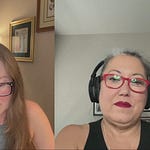Watch me say this:
Hello and welcome to another episode of Sex and the State. I am your host, Cathy Reisenwitz, and I'm trying a new thing where I record a podcast based on an outline and then write my posts based on the transcript, because I'm listening to a lot more things that I'm reading right now, and, yeah, we'll how that goes. I'm more comfortable writing than reading or talking. But, you know, gotta get outside your comfort zone sometimes.
So anyway, the topic of today's post is, US kids don't know their history and how to teach 'em. How to fix public K-12. So, I listened to a podcast called Up First from NPR.
I really like it. It's basically the only way that I know anything about international news. Today they were talking about how history scores are down on the National Assessment of Educational Progress or NAEP, which tests eighth graders across the US on a variety of subjects. So, the NPR story mentioned the pandemic as a potential cause, and talks about school funding.
The thing about school funding is, it's been up, up, and up since the 70’s. The per-pupil spending in the US has risen far faster than inflation, and the outcomes are not up, up, and up since the 70s. It would be great if we could just increase funding and that would improve outcomes. But that just doesn't seem to be the case from the data.
One thing the article doesn't talk about that I think is interesting is I've also seen over the past couple of years the conservative takeovers of school boards and the fight against so-called critical race theory being supposedly taught in public schools and the banning of certain books and taking certain topics and making them off limits for history teachers to talk about.
I don't know that you could find this in any kind of measurable way, but it does seem to me first that this would create a culture of fear around teaching history for teachers. And then also it just seems like wildly misplaced prioritization to worry about whether your kid’s history teacher is making them racist against white people. That doesn't seem like a real problem versus isn't teaching them history, which is clearly a problem. So that's just something I wanted to mention.
The NPR article also mentioned School choice, which is an interesting topic for me.
I actually started to write a book when I was in my first job out of school about school choice because I was super mad about the public education monopoly, having gone through public schools in Alabama, K-12. And I do think that it's a huge problem that kids are forced to go to the school that their homes are zoned for.
I think the way that we do zoning is really problematic. I mean, I think the fact that we have such a hard time firing teachers who are clearly unfit to be in the classroom is a huge problem. I think the fact that, kind of similar to police, the communities that have highest rates of crime and most social needs will often get the worst-performing and worst-paid police officers.
The same is true for public schools. So the public schools where kids have the greatest needs, the teachers who are there are often the lowest performing teachers and get paid the least. Doesn't seem ideal. But, having looked into the data on school choice, it seems like far from a panacea for those problems.
One of the huge problems with school choice is, what do you do with special needs kids? One of the reasons that private schools do such a better job for so much less money is that they're not taking special needs kids. Just keeping these kids from hurting themselves and sexually assaulting each other requires a near one-to-one ratio, adult to student.
And then, you know, if you show up with an empty stomach, a stressful home life, behavioral problems, you're obviously going to require more resources to educate. The other thing that's super important is that one of the biggest, one of the most powerful predictors of educational outcomes is parental involvement.
Schools that perform well have parents that are super involved. Parents, for example, will keep teachers and administrators accountable, will offer feedback that is used in tenure decisions when they say, “Hey, I really wanna make sure my kid gets this teacher and not this other teacher.”
So if you take the kids who come to school with a lot of resources, and the parents who are very involved, you take them outta the public schools and into charters or private schools, the data isn't very clear that outcomes for kids in charter schools are, majorly super, a lot better than the average outcomes for kids in public schools.
But then there is pretty good evidence to suggest that the kids who are left behind in the public schools do worse. So I think school choice is kind of right in that anything would be better than the public education monopoly. But I don't see it as a cure-all for K-12 education in the us.
What I do think would be helpful would be to ban teachers unions. All public sector unions, I think, should go away. When you think about it, a public sector union isn't organizing against, you know, bosses. They're bargaining against taxpayers. And I don't think that that makes sense.
I think that we should ban teacher tenure. I think we need to end zoning, because that will reduce racial and economic segregation as far as where people live and where they go to school. It's telling that public schools today are as racially segregated as they were in the 1970s, largely because of zoning.
And then I think the way that we evaluate rewards, schools need to change. I think we need to take the employment rate and salary after graduation into account when we think about how to fund, and whether to keep certain schools open. And then another thing is the fact that 30% of US jobs require some kind of licensure certification. So it would incentivize schools to offer a path to certification or licensure, prior to graduation. Which I think would be a far better use of time and energy and resources than a lot of whatever schools are doing right now, considering that we've kind of accepted a status quo where the vast majority of people who graduate from high school are essentially unemployable. That just seems absurd to me.
So anyway, those are my thoughts on our failing public education system and some factors that I think are contributing to the problems and some ideas for policies that might help. Thanks.
Sex and the State is a newsletter at the intersection of policy and people. Like it? Upgrade to a paid subscription, buy a guide, follow me on Twitter, support me on Patreon, or just share this post 🙏
~~~~~
This ⬇️ is an affiliate link! Sign up today to support me!
Join the reading revolution! Get key ideas from bestselling non-fiction books, distilled by experts into bitesize text and audio. Explore our vast library of over 5,500 titles and stay up-to-date with 40 new titles added each month.
















